Certified Life Mastery Consultant
Welcome
 Home
Home
 About Dr. Sophia
About Dr. Sophia
 Dr. Sophia's Blog
Dr. Sophia's Blog
 Why Coaching?
Why Coaching?
 Workshops & Events
Workshops & Events
 Contact Dr. Sophia
Contact Dr. Sophia
Coaching Services
 The DreamBuilder
The DreamBuilder
 Life Mastery
Life Mastery
 Group Coaching
Group Coaching
 Individual Coaching
Individual Coaching
 Into Your Genius
Into Your Genius
 Working With The Law
Working With The Law
 VIP Packages
VIP Packages

FREE DOWNLOAD
(Click Here)

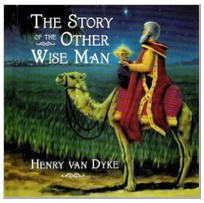 Christmas time is accompanied by many stories, one of which was written by Henry van Dyke, The Other Wise Man, published in 1895. As my Christmas gift to you, I offer this story in an edited and abbreviated version.
Christmas time is accompanied by many stories, one of which was written by Henry van Dyke, The Other Wise Man, published in 1895. As my Christmas gift to you, I offer this story in an edited and abbreviated version.
The other wise man, or Magi, named Artaban, lived in Persia in the days when Augustus Caesar was master of many kings and Herod reigned in Jerusalem.
Artaban was a man of great wealth, great learning and great faith. With his learned companions, they searched the scholarly books of the time to determine the arrival of The One Light who would be born King of Israel long foretold through prophecy, whose coming would be announced by a bright heavenly wonder, the conjunction of two great planets. Agreement was struck between Artaban and three other Magi, Caspar, Melchior, and Balthazar, that by sign of the appearance of the great light in the heavens, 10 days hence, they would rendezvous to commence their journey and make their pilgrimage to Jerusalem to find and worship the promised one.
On speaking to nine of his magi friends in his home, Artaban said, “My three brethren are watching at the ancient temple of the Seven Spheres, at Borsippa, in Babylon, and I am watching here. If the star appears, they will wait for me ten days, then we will all set out together for Jerusalem. I believe the sign will come tonight. I have made ready for the journey by selling all of my possessions and have bought these three jewels – a sapphire, a ruby, and a pearl – I intend to present them as my tribute to the king. I invite you to make this pilgrimage with us that we may worship the newborn king together.’”
While he was speaking, he thrust his hand into the inmost fold of his girdle and drew out three great gems – one blue as a fragment of night sky, one redder than a ray of sunshine, and one as pure as the peak of a snow mountain at twilight. He would give them all to the king. Then one of Artaban’s friends said, “Artaban, this is a vain dream. No king will ever rise from the broken race of Israel. He who looks for him is a chaser of shadows.” And he bid Artaban farewell and left the dwelling.
Each in turn offered his own particular excuse, and finally only his oldest and truest friend remained. He said, “Artaban, I am too old for this quest, but my heart goes with thee.” Then, with a hand on Artaban’s shoulder he said, “Those who would see wonderful things must often be willing to travel alone.”
Left to himself, Artaban put his jewels back into his girdle. Then he parted the curtains and went out onto the roof to again take up his vigil to watch the night sky.
As Jupiter and Saturn rolled together like drops of lambent flame about to blend into one, an azure spark was born out of the darkness beneath them, rounding itself with purple splendor into a crimson sphere.
Artaban bowed his head. “It is the sign,” he said. The king is coming, and I will go to meet him.”
All night long Vasda, the swiftest of Artaban’s horses, had been waiting saddled and bridled in her stall, pawing the ground impatiently and shaking her bit as if she shared the eagerness of her master’s purpose.
As Artaban placed himself upon her back, he said, “God bless us both, and keep our feet from falling and our souls from death.”
Under his encouragement, each day his faithful horse measured off the allotted proportion of the distance, and by nightfall of the tenth day, they approached the outskirts of Babylon. In a little island of desert palm trees, Vasda scented difficulty and slackened her pace. Then she gave a quick breath of anxiety and stood stock-still quivering every muscle.
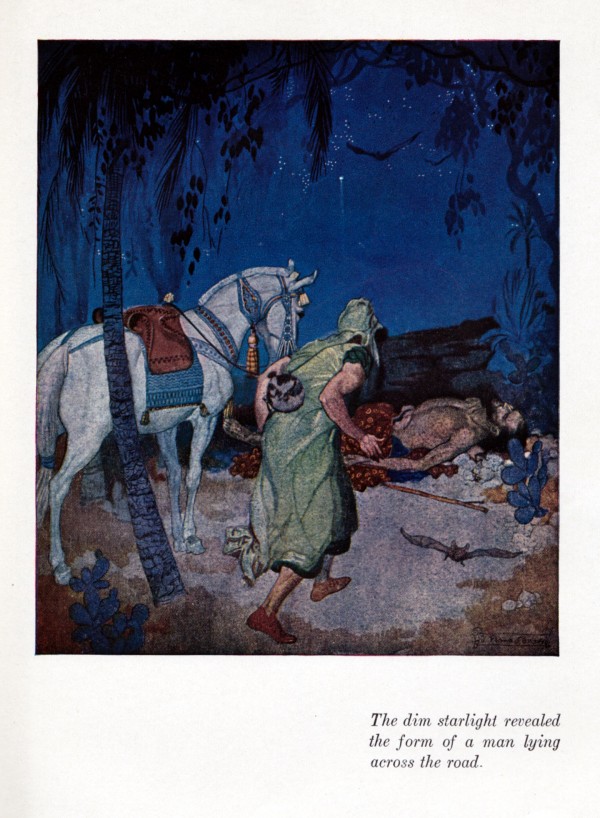 Artaban dismounted. The dim starlight revealed the form of a man lying in the roadway. His humble dress and haggard face showed him to be one of the poor Hebrew exiles who still dwelt in Babylon. His pallid skin bore the mark of the deadly fever that ravished the marshlands of Babylon at this season of the year. The chill of death was in his lean hand. As Artaban turned to go, a sigh came from the sick man’s lips, and the brown bony fingers closed convulsively upon his robe.
Artaban dismounted. The dim starlight revealed the form of a man lying in the roadway. His humble dress and haggard face showed him to be one of the poor Hebrew exiles who still dwelt in Babylon. His pallid skin bore the mark of the deadly fever that ravished the marshlands of Babylon at this season of the year. The chill of death was in his lean hand. As Artaban turned to go, a sigh came from the sick man’s lips, and the brown bony fingers closed convulsively upon his robe.
Artaban felt sorry that he could not stay to minister to this dying stranger, but this was the hour toward which his entire life had been directed. He could not forfeit the reward of his years of study and faith to do a single deed of human mercy. But then, how could he leave his fellow man alone to die?
“God of truth and mercy,” prayed Artaban, “direct me in the holy path of wisdom which only thou knowest.” Then he knew that he could not go on. The magi were physicians as well as astronomers. He took off his robe and began his work of healing. Several hours later the patient regained consciousness.
Then Artaban gave him all he had left of bread and wine. He left a portion of healing herbs and instructions for his care.
Though Artaban rode with the greatest haste the rest of the way, it was after dawn when he arrived at the designated meeting place. His friends were nowhere to be seen. Finally his eyes caught a piece of parchment arranged to attract his attention. He caught it up and read. It said, “We have waited till past midnight, and can delay no longer. We go to find the king. Follow us across the desert.”
Artaban sat down upon the ground in despair and covered his face with his hands. “How can I cross the desert,” said he, “with no food and with a spent horse? I must return to Babylon, sell my sapphire, and buy a train of camels and provisions for the journey. I may never overtake my friends. Only God the merciful knows whether or not I shall lose my purpose because I tarried to show mercy.”
Several days later, when Artaban’s train arrived at Bethlehem, the streets were deserted. It was rumored that Herod was sending soldiers, presumably to enforce some new tax, and the men had taken their flocks and herds back into the hills beyond his reach.
The door of one dwelling was open, and Artaban could hear a mother singing a lullaby to her child. He entered and introduced himself. The woman told him that it was now the third day since the three wise men had appeared in Bethlehem. They had found Joseph and Mary and the young child and had laid their gifts at his feet. Then they had disappeared as mysteriously as they had come. Joseph had taken his wife and babe that same night and had secretly fled. It was whispered that they were going far away to Egypt.
As Artaban listened, the baby reached up its dimpled hand and touched his cheek and smiled. His heart warmed at the touch. Then suddenly, outside there arose a wild confusion of sounds. Women were shrieking. Then a desperate cry said, “The soldiers of Herod are killing the children.”
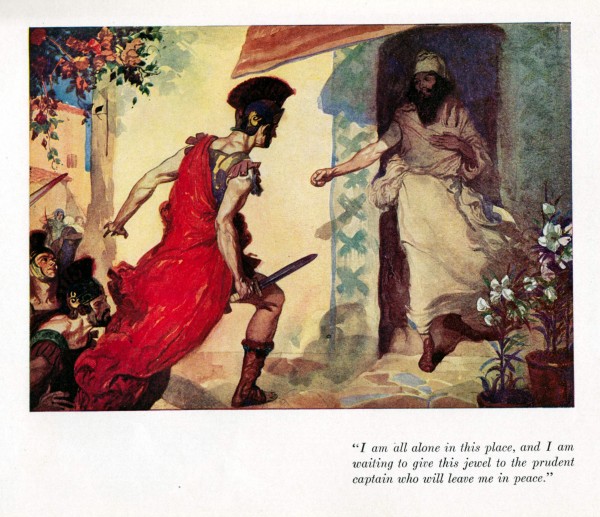 Artaban went to the doorway. A band of soldiers came hurrying down the street with dripping swords and bloody hands. The captain approached the door to thrust Artaban aside, but Artaban did not stir. His face was as calm as though he were still watching the stars. Finally, his outstretched hand revealed the giant ruby. He said, “I am waiting to give this jewel to the prudent captain who will go on his way and leave this house alone.”
Artaban went to the doorway. A band of soldiers came hurrying down the street with dripping swords and bloody hands. The captain approached the door to thrust Artaban aside, but Artaban did not stir. His face was as calm as though he were still watching the stars. Finally, his outstretched hand revealed the giant ruby. He said, “I am waiting to give this jewel to the prudent captain who will go on his way and leave this house alone.”
The captain, amazed at the splendor of the gem, took it and said to his men, “March on, there are no children here.”
Then Artaban prayed, “Oh God, forgive me my sin. I have spent for man that which was meant for God. Shall I ever be worthy to see the face of the king?
But the voice of the woman, weeping for joy in the shadows behind him, said softly, “Because thou hast saved the life of my little one, may the Lord bless thee and keep thee; the Lord make his face to shine upon thee and be gracious unto thee; the Lord lift up his countenance upon thee and give thee peace.”
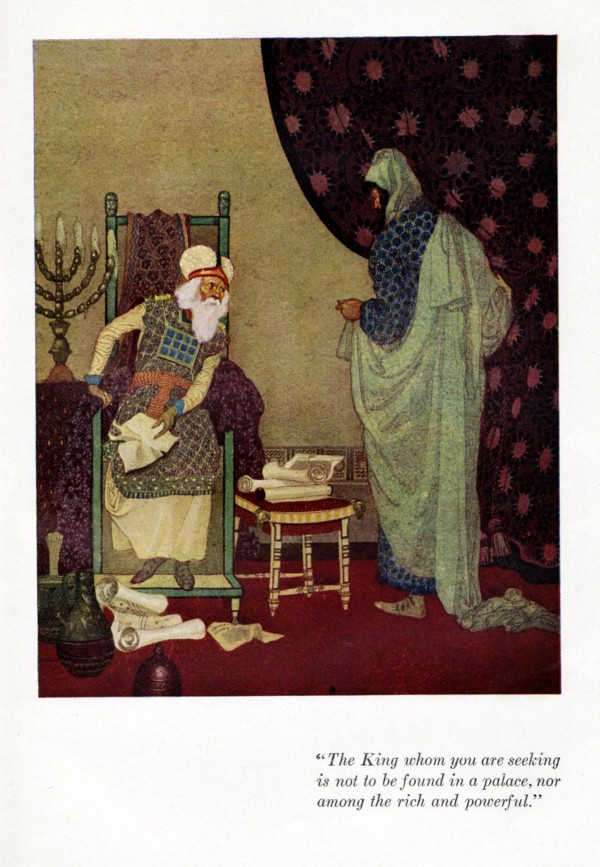 Then Artaban, still looking for the king, went on into Egypt, seeking everywhere for traces of the little family that had fled before him from Bethlehem. For many years we follow Artaban in his search. We see him at the pyramids. We see him in an obscure house in Alexandria, taking counsel with a Hebrew rabbi who told him to seek the king not among the rich but among the poor. Then we follow him from place to place. He passed through countries where famine lay heavy upon the land and the poor were crying for bread. He made his dwelling in plague-stricken cities where the sick were languishing in the bitter companionship of helpless misery. He visited the oppressed and the afflicted in the gloom of subterranean prisons. He searched the crowded wretchedness of slave markets. Though he found no one to worship, he found many to serve. As the years passed, he fed the hungry, clothed the naked, healed the sick, and comforted the captive.
Then Artaban, still looking for the king, went on into Egypt, seeking everywhere for traces of the little family that had fled before him from Bethlehem. For many years we follow Artaban in his search. We see him at the pyramids. We see him in an obscure house in Alexandria, taking counsel with a Hebrew rabbi who told him to seek the king not among the rich but among the poor. Then we follow him from place to place. He passed through countries where famine lay heavy upon the land and the poor were crying for bread. He made his dwelling in plague-stricken cities where the sick were languishing in the bitter companionship of helpless misery. He visited the oppressed and the afflicted in the gloom of subterranean prisons. He searched the crowded wretchedness of slave markets. Though he found no one to worship, he found many to serve. As the years passed, he fed the hungry, clothed the naked, healed the sick, and comforted the captive.
Once we see Artaban for a moment as he stood alone at sunrise, waiting at the gate of a Roman prison. He had taken from its secret resting place in his bosom the last of his jewels that he was saving for the king. Shifting gleams of azure and rose trembled upon its surface. It seemed to have absorbed some of the colors of the lost sapphire and ruby, just as a noble life draws into itself its profound purpose, so that all that has helped it is transfused into its very essence; the pearl had become more precious because it had long been carried close to the warmth of a beating human heart.
Thirty-three years had now passed away since Artaban began his search and he was still a pilgrim. His hair was now white as snow. He knew his life’s end was near, but he was still desperate with hope that he would find the king. He had come for the last time to Jerusalem.
It was the season of Passover, and the city was thronged with strangers. There was a singular agitation visible in the multitude. A secret human tide was sweeping them toward the Damascus gate.
Artaban inquired where they were going. One answered, “We are going to the execution on Golgotha, outside the city walls. Two robbers are to be crucified, and with them another called Jesus of Nazareth, a man who has done many wonderful works among the people. But the priests and elders have said that he must die because he claims to be the Son of God. Pilate sent him to the cross, because he said that he was the ‘King of the Jews.’”
How strangely these familiar words fell upon the tired heart of Artaban. They had led him for a lifetime over land and sea. And now they came to him darkly and mysteriously like a message of despair. The king had been denied and cast out. He was now about to perish. Perhaps he was already dying. Could he be the same for whom the star had appeared thirty-three long years ago?
Artaban’s heart beat loudly within him. He thought, “The ways of God are stranger than the thoughts of men, and it may be that I shall yet find the king and be able to ransom him from death by giving my treasure to his enemies.”
But as Artaban started toward Calvary, he saw a troop of Macedonian soldiers coming down the street, dragging a sobbing young woman with torn dress and disheveled hair. As Artaban paused, she broke away from her tormentors and threw herself at his feet, her arms clasping around his knees.
“Have pity on me,” she cried, “and save me, for the sake of the God of purity. My father was also of the magi but he is dead, and I am to be sold as a slave to pay his debts.”
Artaban trembled as he again felt the old conflict arising in his soul. It was the same that he had experienced in the palm grove of Babylon and in the cottage at Bethlehem. Twice the gift which he had consecrated to the king had been drawn from his hand to the service of humanity. Would he now fail again? One thing was clear – he must rescue this helpless child from evil.
He took the pearl from his bosom. Never had it seemed so luminous, so radiant, so full of tender, living luster. He laid it in the hand of the slave and said, “Daughter, this is thy ransom. It is the last of my treasures which I had hoped to keep for the king.”
While he yet spoke, the darkness of the sky thickened and the shuddering tremors of an earthquake ran through the ground.
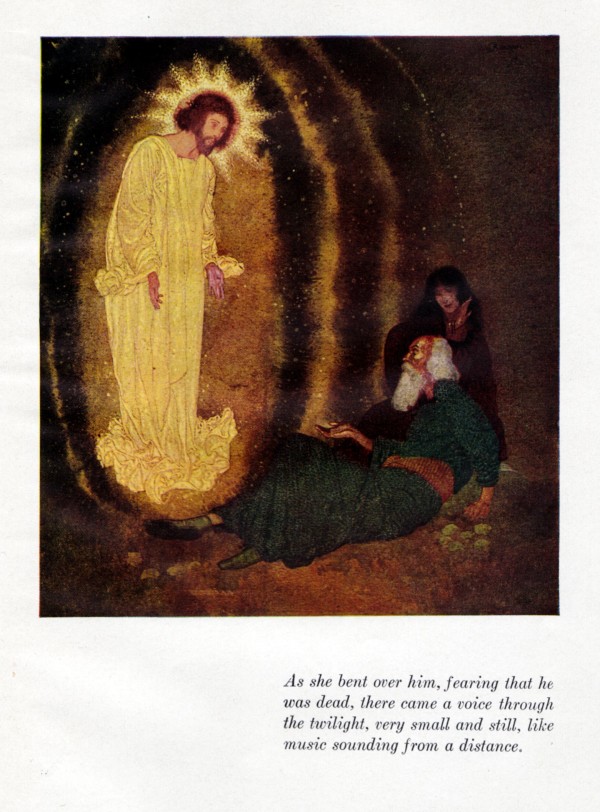 The houses rocked. The soldiers fled in terror. Artaban sank beside a protecting wall. What had he to fear? What had he to hope for? He had given away the last remnant of his tribute to the king. The quest was over, and he had failed. What else mattered? As one lingering pulsation of the earthquake quivered beneath him, a heavy tile, shaken from a roof, fell and struck him on the temple. He lay breathless and pale. The rescued girl leaned over him, fearing he was dead. Then there came a still, small voice through the twilight. It was like distant music. The notes were clear, but the girl could not understand the words.
The houses rocked. The soldiers fled in terror. Artaban sank beside a protecting wall. What had he to fear? What had he to hope for? He had given away the last remnant of his tribute to the king. The quest was over, and he had failed. What else mattered? As one lingering pulsation of the earthquake quivered beneath him, a heavy tile, shaken from a roof, fell and struck him on the temple. He lay breathless and pale. The rescued girl leaned over him, fearing he was dead. Then there came a still, small voice through the twilight. It was like distant music. The notes were clear, but the girl could not understand the words.
Then the lips of Artaban began to move, as if in answer, and she heard him say, “Not so, my Lord: For when saw I thee hungered, and fed thee? Or thirsty, and gave thee drink? Or naked, and clothed thee? When saw I thee sick or in prison, and came unto thee? Thirty-three years have I looked for thee; but I have never see thy face, nor ministered unto thee, my king.”
As he ceased, the sweet voice came again. And again, the maid heard it, very faintly and far away. But now she understood the words which said, “Verily, I say unto thee, that inasmuch as thou hast done it unto one of the least of these my brethren, thou hast done it unto me.”
A calm radiance of wonder and joy lighted the face of Artaban as one long, last breath exhaled gently from his lips. His journey was ended. His treasures were accepted. The Other Wise Man had found the King.
May this blessed holiday season fill you with joy! And above all, may peace dwell in your heart and reign on your lips and in your life this day and always.
Merry Christmas,
Dr. Sophia
Text derived from: The Project Gutenberg eBook, The Story of the Other Wise Man, by Henry van Dyke, and from Sterling W. Sill’s Christmas Sermons, 1973, Deseret Press.

Essential Qualities to Live a More Fulling Life
(Free Download)


FREE DOWNLOAD
(Click Here)